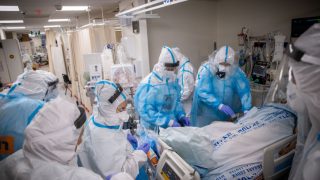Experts offered their recommendations for shoring up the healthcare sector during a Senate Health, Education, Labor and Pensions (HELP) subcommittee hearing on Thursday.
Recommendations included expanding and diversifying the healthcare workforce and investing in nurse practitioner (NP) residencies. One witness suggested scrapping COVID-19 vaccine mandates.
The Association of American Medical Colleges predicts a physician shortage of up to 124,000 by 2034, said Sen. John Hickenlooper (D-Colo.), chair of the HELP Subcommittee on Employment and Workplace Safety. In addition, at least 200,000 nurses will need to be hired annually to meet increased demands, he noted.
“If we’re going to make a dent in these daunting estimates, we need to get started now. … We need to improve the recruitment, retention, and upskilling opportunities of our healthcare workers,” Hickenlooper added.
Mike Braun (R-Ind.), ranking member of the subcommittee, pointed out that approximately 18% of healthcare workers quit their jobs during the COVID pandemic, and 31% have considered leaving.
He agreed that something needs to be done to address “the biggest issue in the biggest sector in our economy.”
Hickenlooper suggested making it easier for people without college degrees to access early-stage healthcare jobs and increasing opportunities for mid-career professionals to enhance their skills and climb the career ladder.
While Braun also stressed the importance of destigmatizing healthcare jobs that don’t require a 4-year college degree, he was less enthusiastic about pumping more dollars into the workforce, given that Congress has already invested $178 billion to help stabilize the sector in the Provider Relief Fund.
“It will take more than just spending money,” he said.
NPs the Next Generation of Primary Care?
Margaret Flinter, PhD, APRN, chair of the Board of Directors for the National Nurse Practitioner Residency and Fellowship Training Consortium in Middletown, Connecticut, echoed the urgent need for action.
The primary care workforce in particular is battling early retirements, increased burnout, an aging staff, and competition from other specialties, she noted.
NPs can be a solution to the crisis, Flinter suggested. If more NPs were given the chance to participate in postgraduate residency or fellowship training programs — the way doctors and dentists are — they could be the next generation of primary care.
But new NPs, particularly those working in underserved areas, are often shocked to learn just how sick their patients are or how complex their needs are. “And this gap between preparation and practice quickly gives rise to burnout, frustration, and too often … early departure by nurse practitioners from full-scope primary care roles,” she said.
According to the literature, those who complete the “intensive clinical training with expert preceptors” that residencies provide stay in primary care and in underserved areas at higher rates than the national average, she added.
In 2019, the Health Resources & Services Administration’s Bureau of Health Workforce funded only 36 of the 250 NP residency and fellowship training programs that specialize in primary care, Flinter pointed out, calling for more federal support to continue these types of programs and allow new ones to launch.
Diversifying the Workforce
Reynold Verret, PhD, president of Xavier University of Louisiana in New Orleans, spoke about the ways in which historically Black colleges and universities (HBCUs) like his have helped to address the lack of Black representation in health and science fields.
Since 2016, Xavier University has started 23 new undergraduate and graduate programs in areas such as data science, medical laboratory science, and neuroscience, as well as a Master’s of Health Sciences, Physician Assistant Studies and a Master’s of Public Health, Health Equity, he noted.
However, Verret also called for more investments to grow the pipeline of students who can attend schools like Xavier “without the burden of lifelong debt.”
“America cannot afford to develop only a subset of its talent, forsaking many whose contributions are needed, losing them due to socioeconomic barriers,” he added.
Verret urged Congress to double Federal Pell Grants, which help low-income students access higher education; renew subsidies for the first 2 years of students’ education at HBCUs; and invest an additional $5 billion to expand Title III institutional grants.
Norma Quinones, LPN, nursing services manager and a National Institute for Medical Assistant Advancement (NIMAA) site coordinator for Clinica Family Health in Lafayette, Colorado, explained the role her own institution has played in addressing the primary care workforce shortage, such as by helping to create entry points for long-term health careers, while also diversifying the workforce.
The NIMAA program doesn’t require students to incur the kind of debt that more expensive programs do, which often compel students to take higher-paying jobs in the for-profit healthcare sector. Instead, NIMAA offers an alternative for many non-traditional students — single parents, recent immigrants, first-generation high school graduates, and older adults — to work part-time, while preparing them to work in even the most challenging primary care settings, Quinones said.
Approximately 90% of medical assistants are women, and the majority are Black, indigenous, or people of color, she noted.
“This successful program could be scaled to reach thousands more students each year and to help address critical workforce shortages in diverse urban and rural communities across the country,” she said.
Vaccine Freedom for Healthcare Workers?
Rachel Greszler, a research fellow and economist at the Heritage Foundation in Washington D.C., took a different tack.
Her primary concern wasn’t a lack of funding but instead the existence of regulations that limit care, including vaccine mandates. Prior to the pandemic, the healthcare workforce had been growing at a faster rate than the overall workforce, but the trend reversed following the enactment of vaccine mandates, she said.
Greszler estimated that CMS’s vaccine mandate could result in 70,000 healthcare workers being removed from their jobs.
“Congress should prevent this by protecting medical providers’ rights to set their own vaccine policies,” she urged.
In the long term, however, growing the healthcare workforce is a state issue, she said, arguing that doctors and nurses should be able to practice wherever there is the most need and not based on the confines of their licenses. She also called for an end to states “needlessly restricting” the services that NPs have been trained to deliver, which limits patient care and increases costs.
Still, she added, the federal government can help by removing unnecessary burdens and promoting competition, such as by shifting the burden onto states when they enact “anti-competitive” certificate of need laws (which require approval of certain healthcare projects by state health planning agencies and other groups in order to avoid duplication); by expanding telehealth; and by reducing the administrative burden on providers in federal health programs.
“Lives are literally at stake because of the healthcare workforce shortage and many regulations are needlessly making this worse,” Greszler said.
![author['full_name']](data:image/png;base64,R0lGODlhAQABAAD/ACwAAAAAAQABAAACADs=)
Shannon Firth has been reporting on health policy as MedPage Today’s Washington correspondent since 2014. She is also a member of the site’s Enterprise & Investigative Reporting team. Follow
Note: This article have been indexed to our site. We do not claim legitimacy, ownership or copyright of any of the content above. To see the article at original source Click Here



![author['full_name']](https://indexofnews.com/wp-content/uploads/sites/2/2022/02/localimages/shannonFirth_188.jpg)










